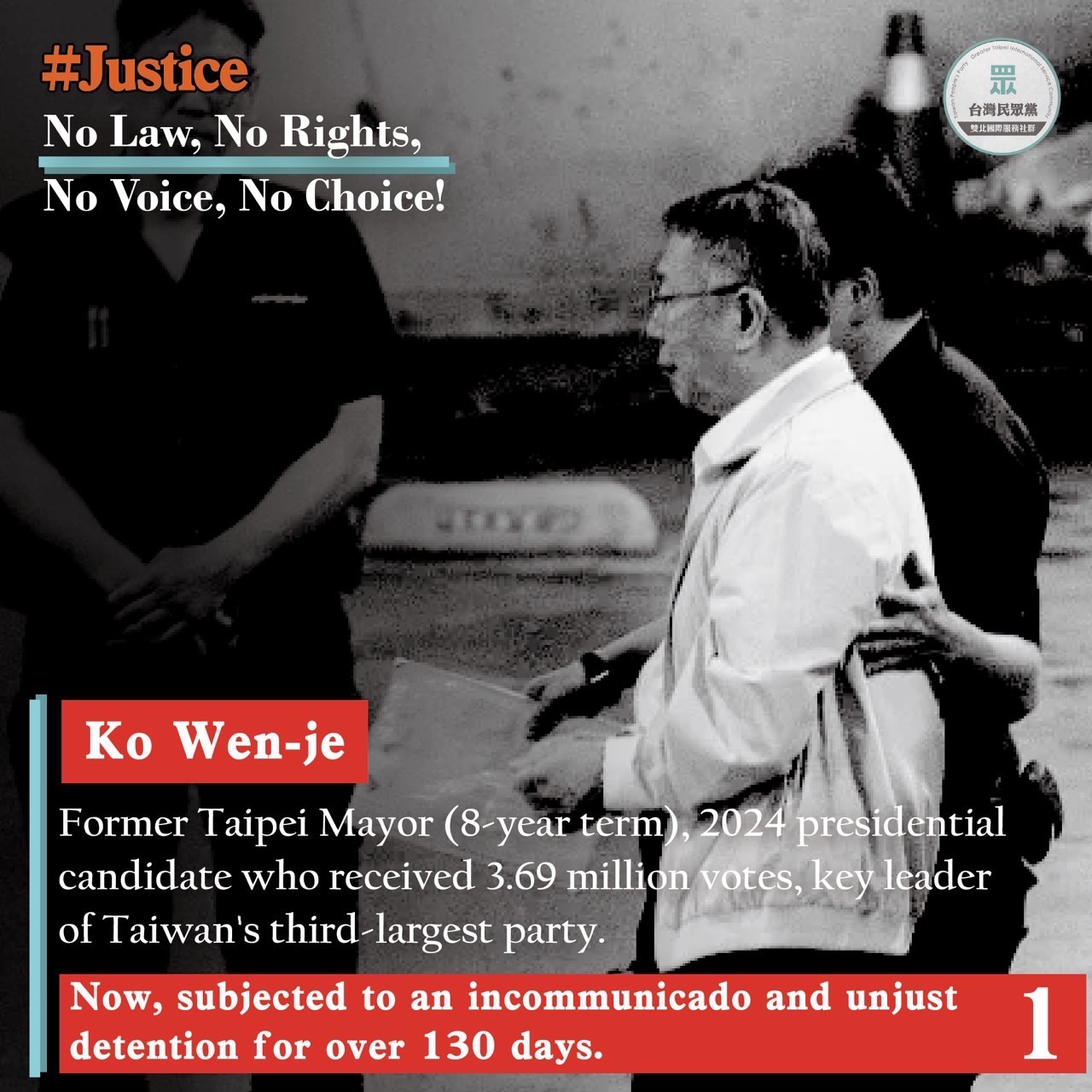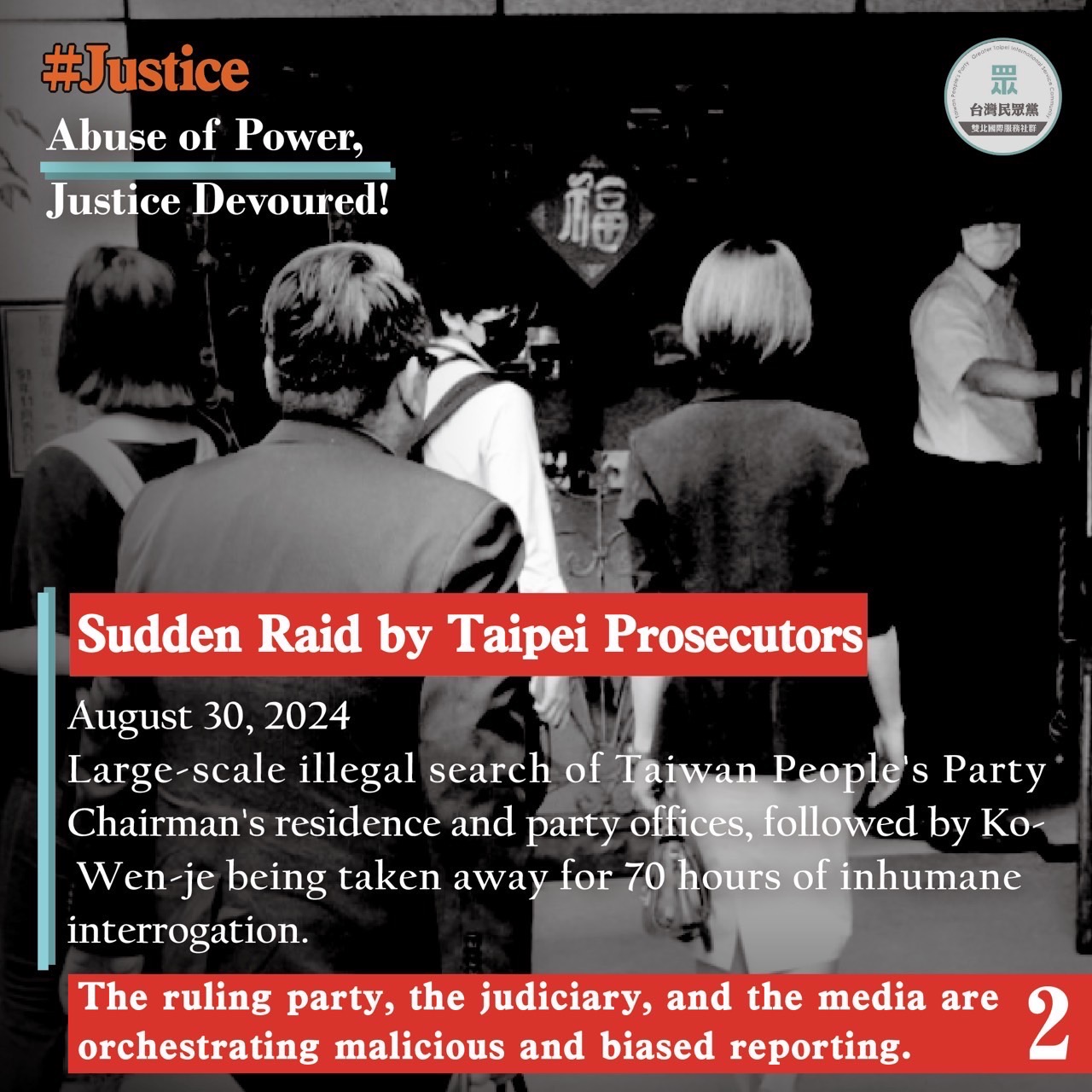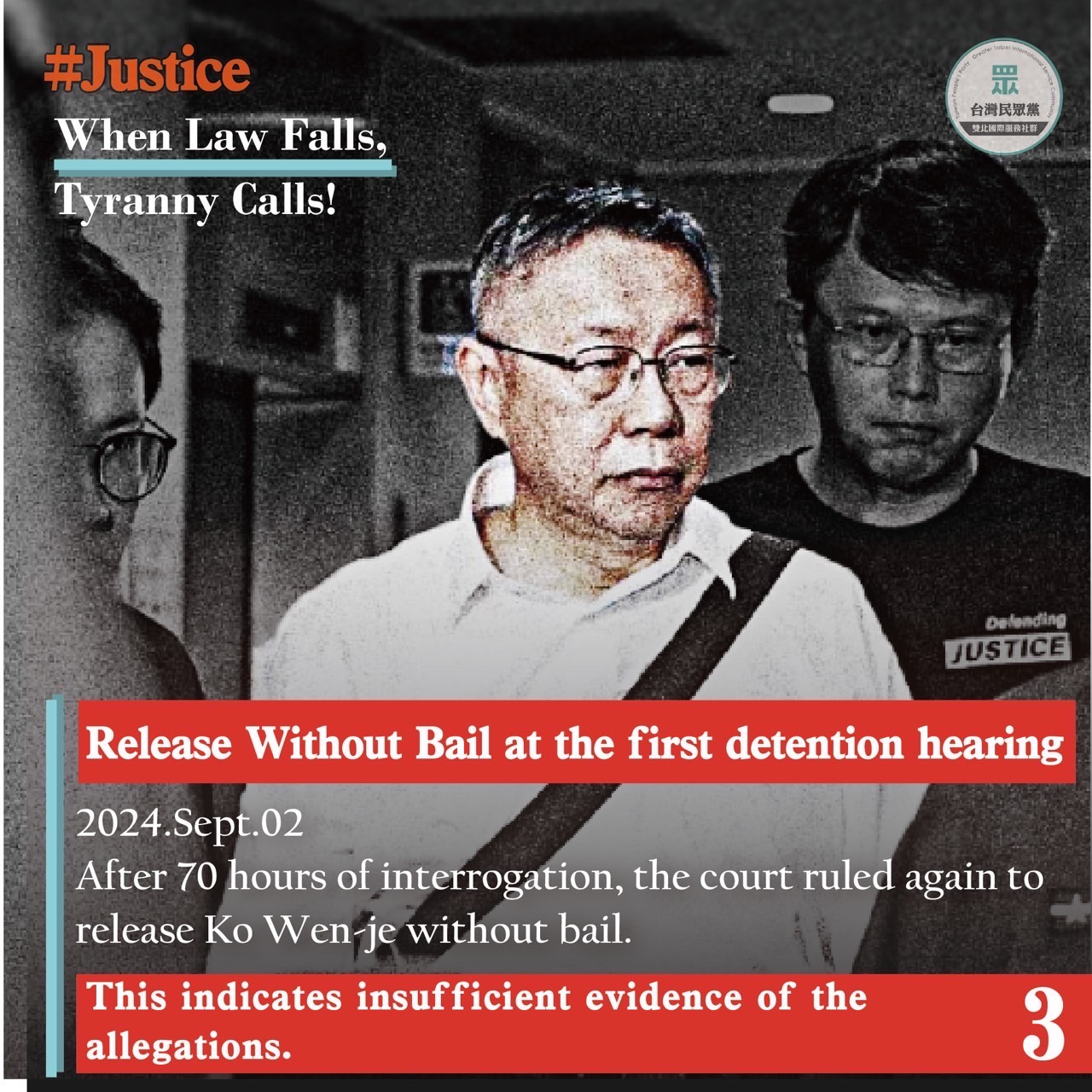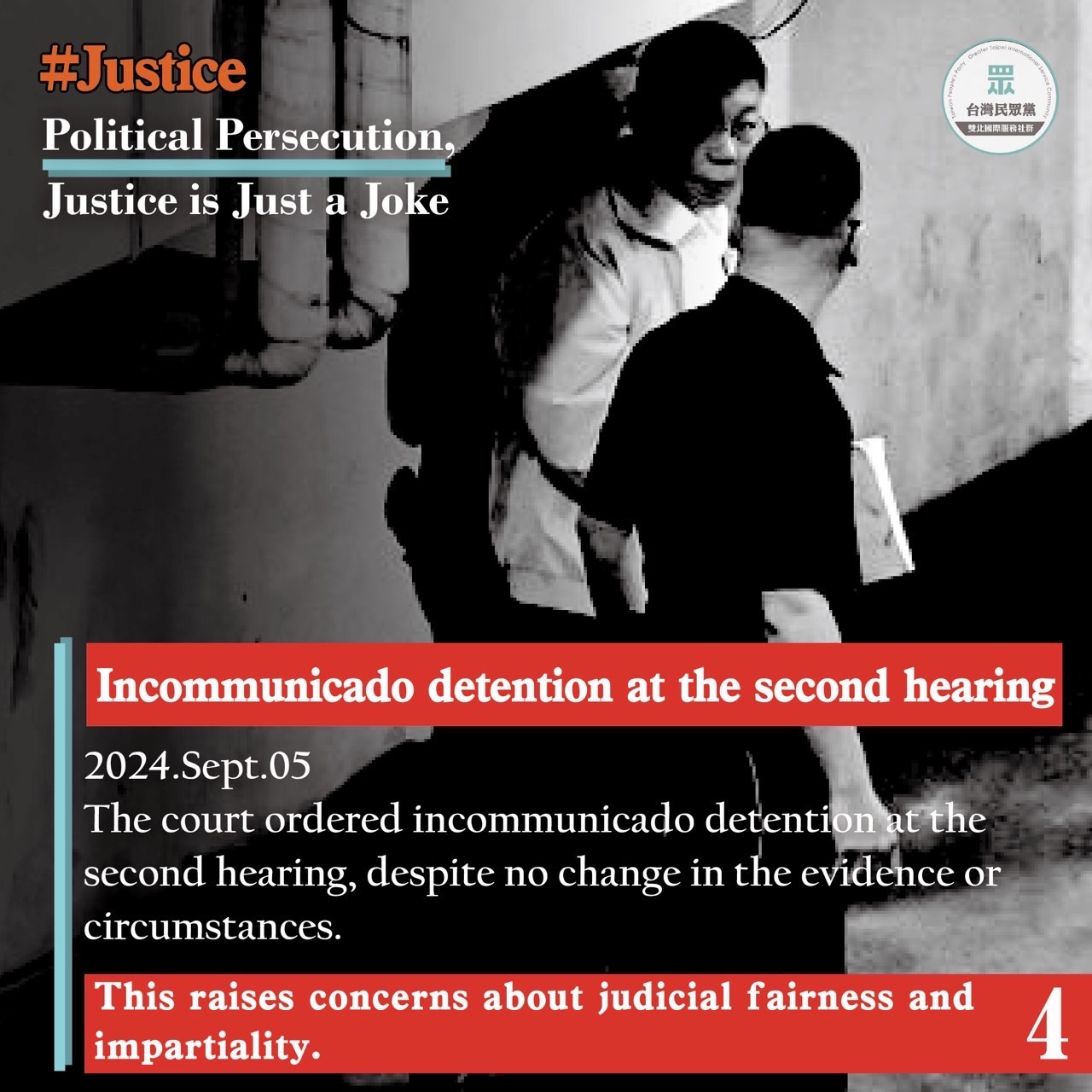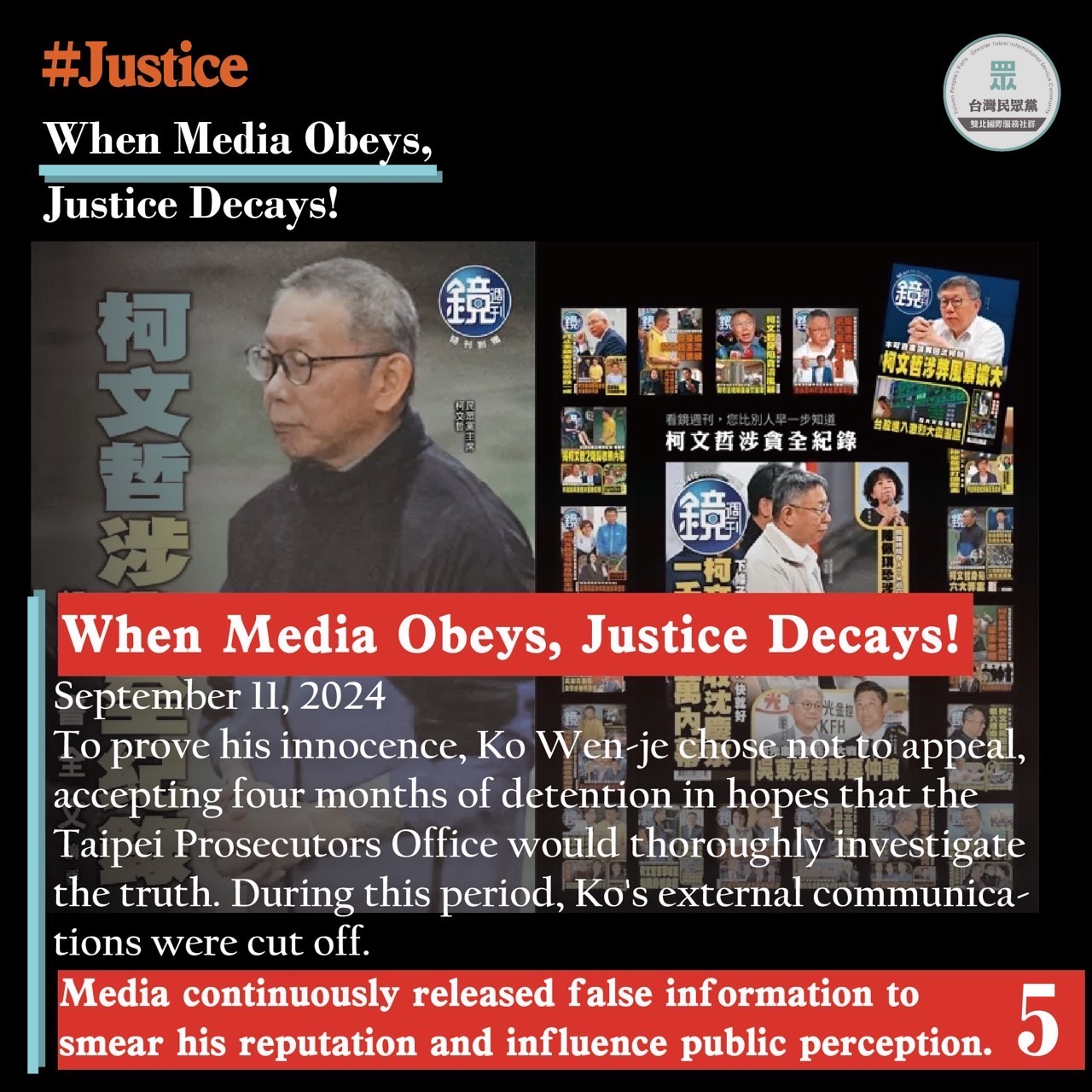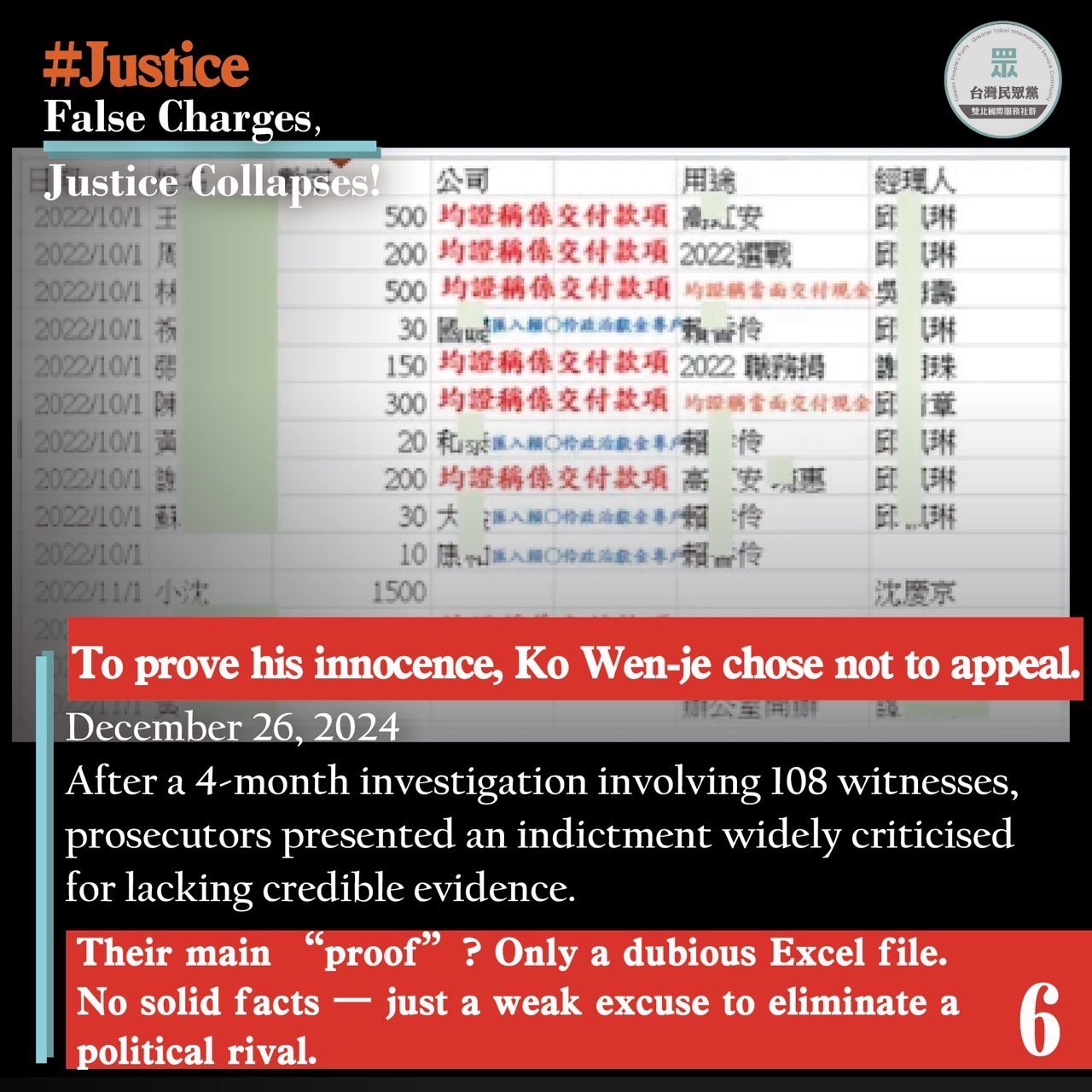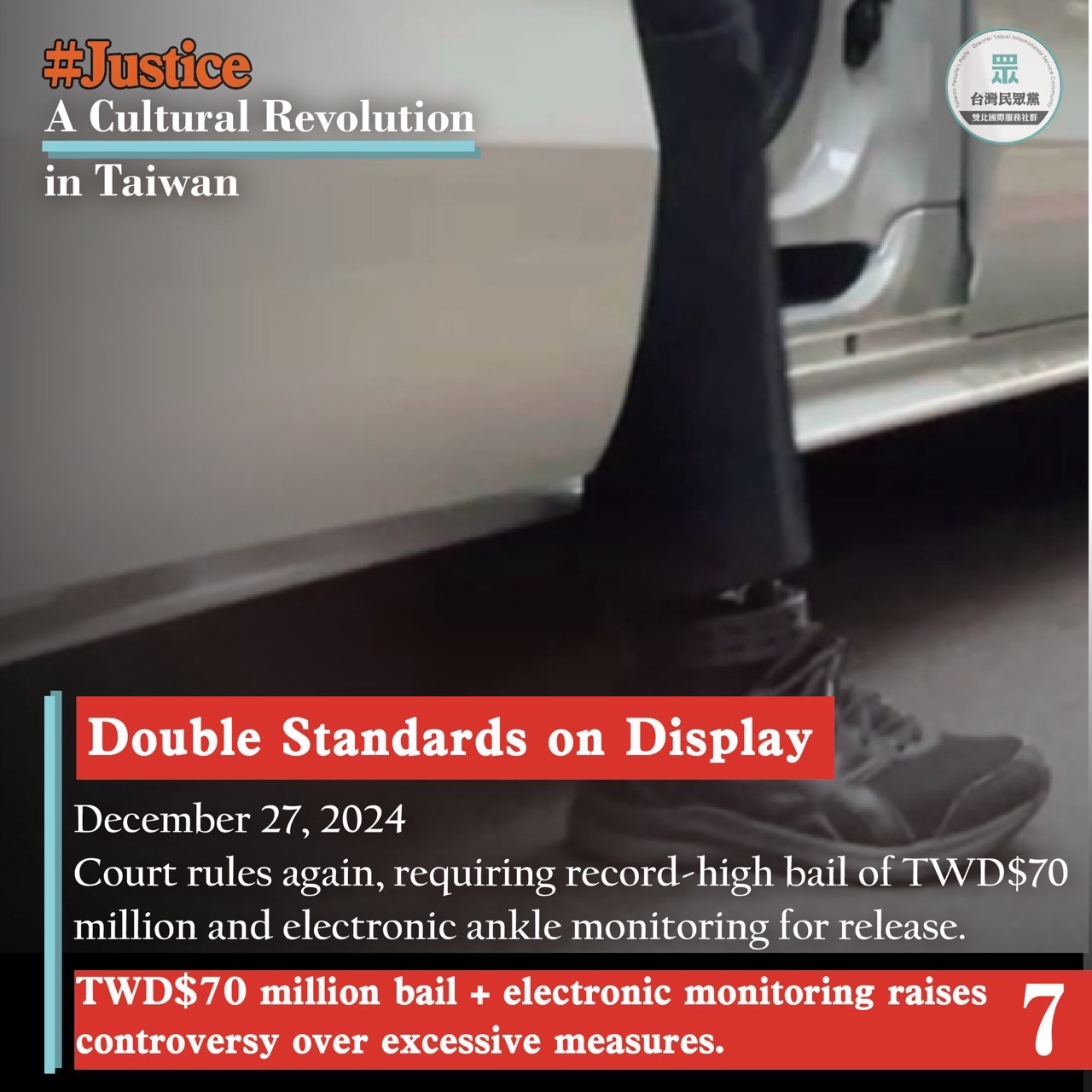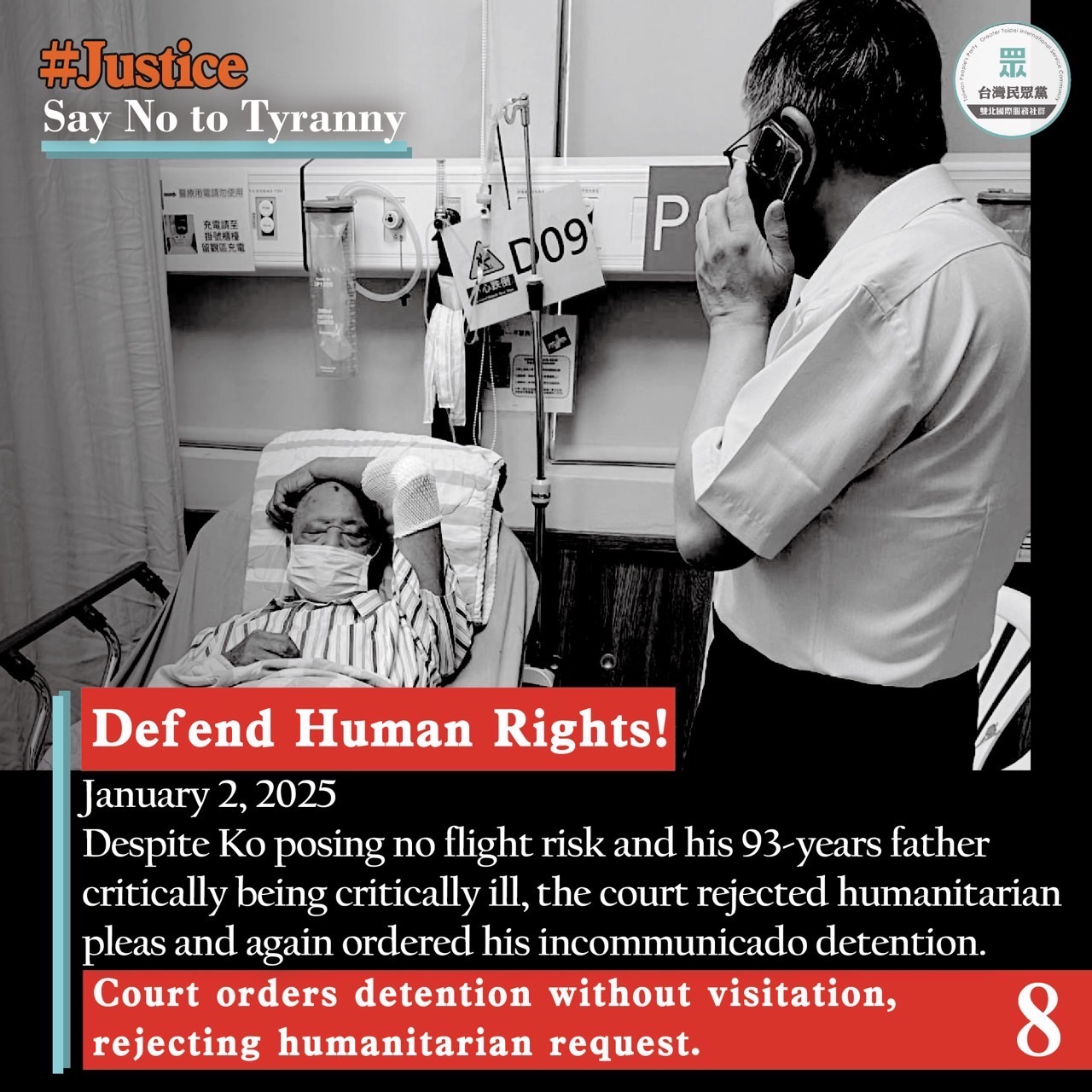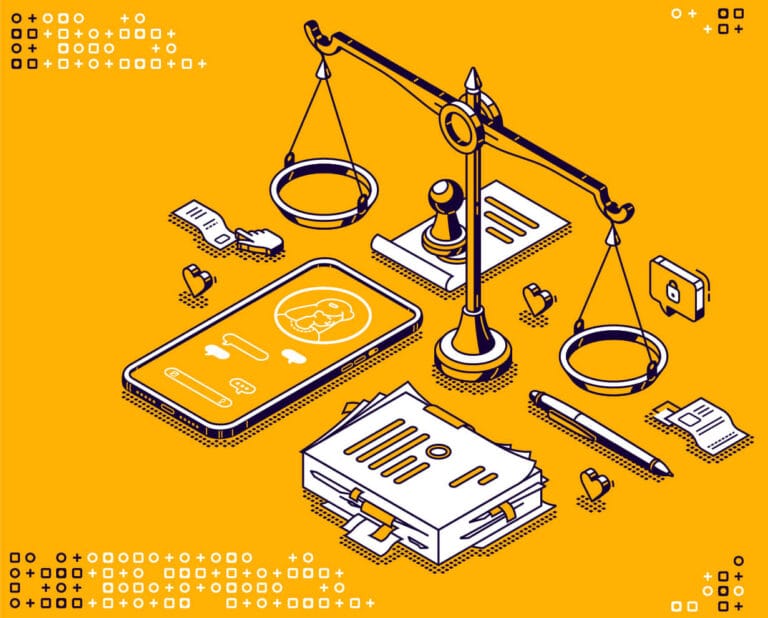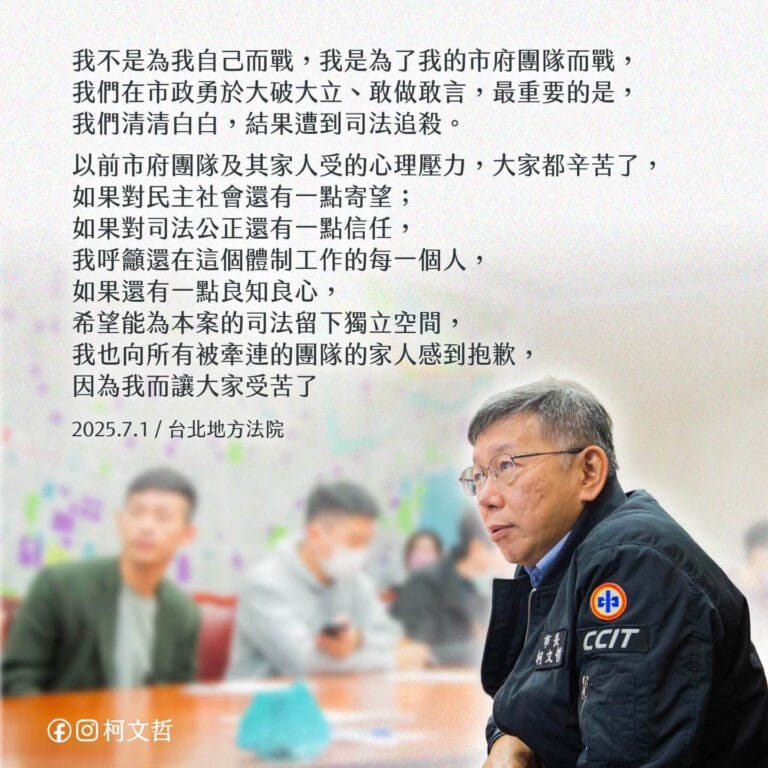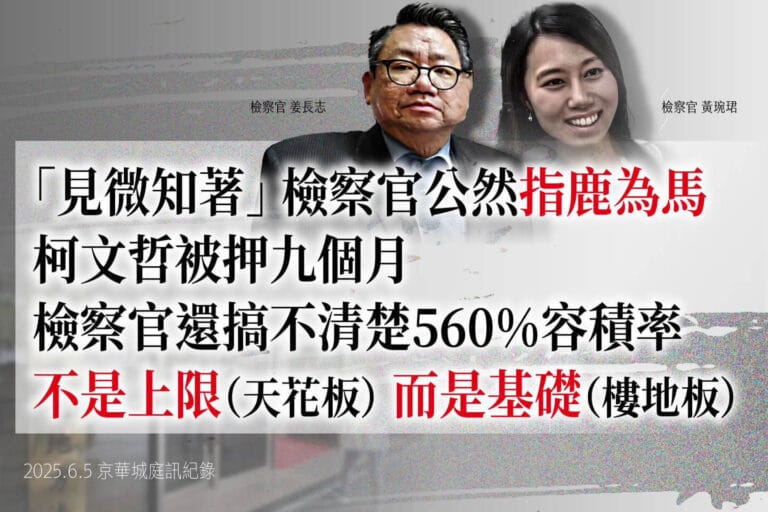We are witnessing the collapse of justice in Taiwan
Today, in 2024, we are witnessing the collapse of justice in Taiwan, a dark age of DPP rule, in which they have captured the courts and turned the media into propaganda machines, condemning the country to chaos.
On August 30, 2024, the Taipei District Prosecutors Office raided Ko Wen-je’s residence and personal office *1, and illegally searched the office of the Taiwan People’s Party. Starting at 7 a.m., Ko voluntarily cooperated with the Agency Against Corruption’s interrogation. The interrogation was moved to the Taipei District Prosecutors Office in the early hours of August 31, even though nighttime interrogations are unlawful. When Ko requested to return home to rest, prosecutors detained him for refusing to be interrogated, while covering up the lack of legitimacy of nighttime interrogations. This marked the first day of the Taiwan judiciary’s return to the dark ages.
This day began at 6:30 a.m. While Ko was still washing up at home, the Taiwan media began to relentlessly spread disinformation, with complete disregard for Ko’s explanations.
After almost 72 hours of interrogation and detention, at 3:45 a.m. September 2, Judge Chu Chia-i of the Taipei District Court unconditionally released Ko from detention. The reason was “the prosecution’s evidence could not establish reasonable suspicion of a crime.”
(Video: Ko’s unconditional release.)
In Taiwan, prosecutors are allowed to appeal an unlimited number of times (a power that many democracies do not grant), so prosecutors appealed the judge’s decision. The Taiwan High Court, controlled by the ruling party, granted the appeal and vacated the district court’s ruling. On September 5, with the same evidence presented by prosecutors, the pro-ruling party judge Lu Cheng-ye *2 ordered Ko to be put in incommunicado detention.
In 2013, Judge Lu Cheng-ye was impeached for serious violations of due process and the code of judicial ethics, which infringed on litigant rights and damaged the judiciary’s credibility.
Ko Wen-je was detained at the Taipei Detention Center. Prosecutors sent for Ko multiple times to interrogate him, but failed to properly serve official summonses. Ko only learned about the prosecutors’ violation of due process through his cellmate, who questioned the lack of summons paperwork. When Ko learned of this requirement, he refused to appear for questioning without a summons. The media reported his absence as evidence of Ko’s shame and guilt, and continued their smear campaign against him.
The Taiwan People’s Party lacks traditional media resources. With Ko held incommunicado and unable to speak publicly for himself, there was an unprecedented flood of character assassinations, disinformation, and political attacks on Ko from traditional media, magazines, and the internet, seeking also to influence the international news media.
In Taiwan, prosecutors can hold a person in custody for a maximum of four months before filing charges. For Ko, the four months was to expire on January 5, 2025. The Taipei District Court held a bail hearing from the evening of December 26, 2024, to the early morning of December 27. On the 27th, Judge Hsu Fang-yu, along with two other judges, granted Ko release on bail of NT$30 million. This was the first time bail was granted.
With the power of unlimited appeals, the prosecution appealed a total of three times. Each time, the High Court, which is under the Judicial Yuan (whose staff are appointed by the ruling party), vacated the district court’s judgment and remanded the case.
At the second bail hearing, the judge set bail at NT$70 million, the highest amount for a politician in Taiwan’s history, and required Ko to wear an electronic ankle monitor. When prosecutors appealed again, the High Court cited the government’s inability to monitor electronic communications as a reason to vacate the bail decision. Under unreasonable pressure, the district court ordered that Ko Wen-je be detained incommunicado.
Can you find the smoking gun?
The only key piece of evidence in the indictment filed by the prosecution was an Excel file owned by username “wen” on a USB drive. The authenticity of the file has not been established. It has only been established that, according to Ko’s longtime associate, the USB drive belongs to Ko.
This is at the core of the Taiwan People’s Party and many Taiwanese people’s doubts about the ruling party–Taiwan’s ruling party and its media often abuse half-truths and logical leaps to pass judgment.
In addition, after Ko’s indictment was made public, a witness’s lawyer stated that certain witness statements in the indictment had not been stated by the witness.
An indictment with no key evidence and low credibility. Yet judges have no choice but to bow down to the regime. This is why the people are standing up in fury.
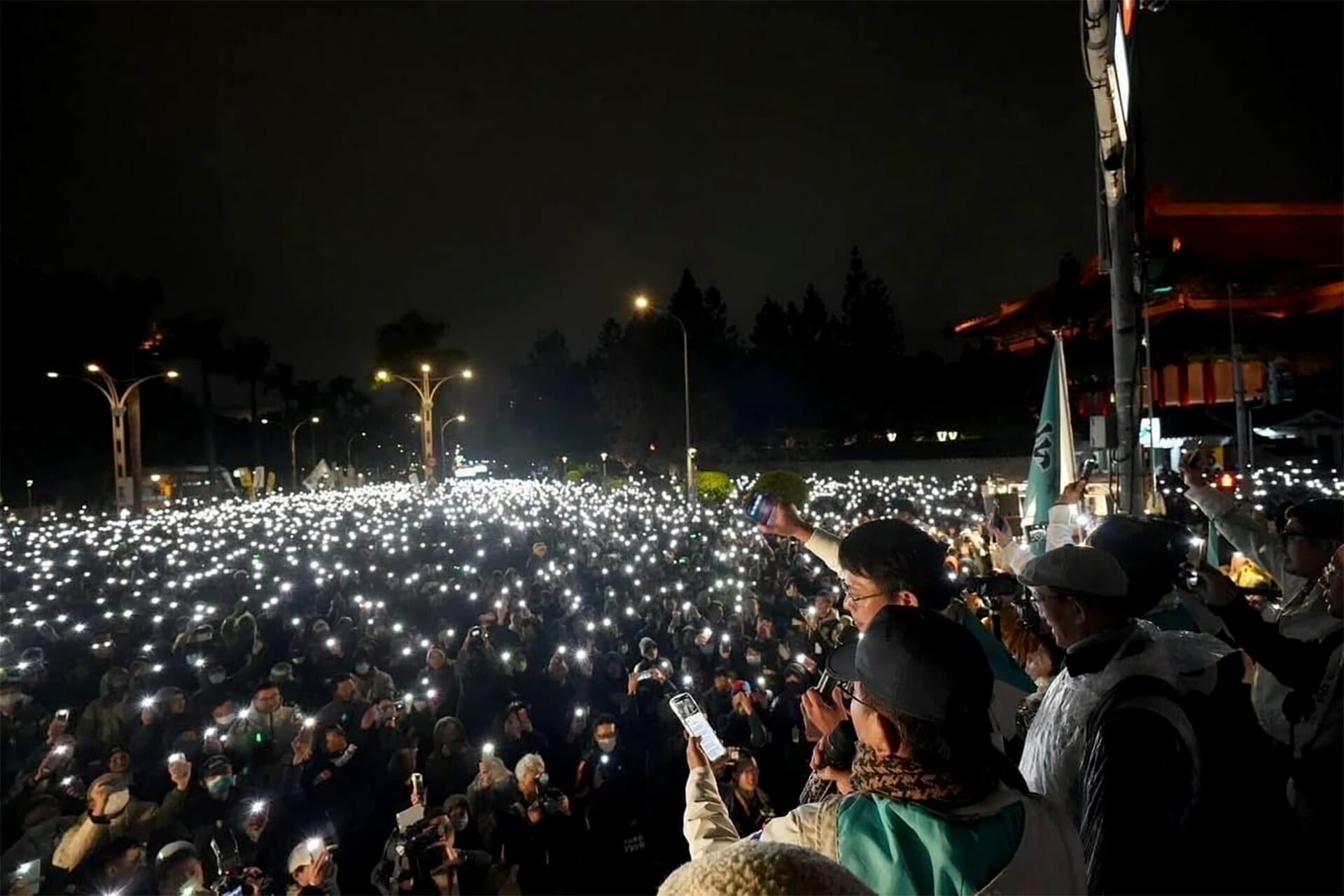
Related Reading: Ko Wen-je – Preparation of the court shorthand – KP editor
2025-1-11 Live Highlights:
Music version:
Exegesis:
*1: Ko Wenzhe’s personal office is at a different address from the office of the Central Party Department of the Taiwan People’s Party, and there is no audio or video recording when the Taiwan People’s Party office is searched.
*2: Judges impeached by the Supervisory Yuan have violated case-handling procedures and judges’ ethics and damaged judicial credibility https://www.cy.gov.tw/News_Content.aspx?n=124&s=6583
2013-06-06
Judge Lu Zhengye of the Taipei District Court, during his tenure as a judge of the Criminal Review Division of the court, seriously violated the provisions of the case-handling procedures and the ethical norms of judges, infringed on the rights and interests of litigants, damaged the credibility of the judiciary, violated the evidence of the accident, and the circumstances were serious, and the Supervision Yuan passed a proposal for impeachment by the Supervisory Committee Lin Chengyi and Li Fudian on June 6, 102, and the whole case was transferred to the Judicial Yuan for trial.
The impeachment text points out that Lu Zhengye undertook the trial of eight criminal cases, including the Taipei District Court’s 100 Annual Trial Transaction Zi No. 179, and failed to conduct litigation trials in accordance with legal procedures, including failing to allow the defendant to prepare for the legal hesitation period for litigation, ignoring the provisions of the Criminal Procedure Law on summoning the defendant to apply summons, depriving the victim of the opportunity to appear in court to present his opinions, one-sided expressing to the defendant a biased position of denying the plaintiff’s request for damages, and making judgments in a rude manner, infringing on the litigation rights and interests of the defendant and the informant. In some of these cases, the higher trial courts have sternly accused the procedural violations of the law, affecting the people’s trust in the quality of the trials, and the evidence of the violations is clear.
The committee member said that judges exercising judicial functions and powers on behalf of the state should have scrupulously abided by the provisions of the law and prudently performed their judicial duties from a detached, impartial, and objective standpoint.
